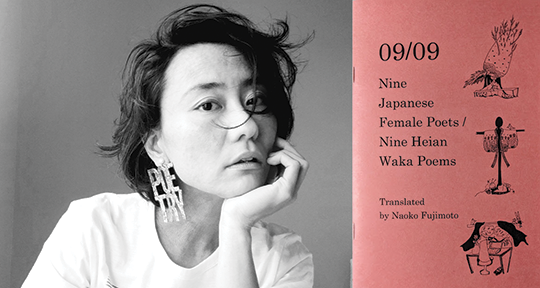09/09 Nine Japanese Female Poets / Nine Heian Waka Poems, translated from the Japanese by Naoko Fujimoto, Toad Press/Veliz Books, 2024
My parents were criticized for allowing a girl to study advanced language skills and piano lessons–for what–“Why don’t you keep your daughter in Nagoya?” Some teachers looked at me saying, “You are not even the smartest, nor a boy.”
Have you ever wished to be a boy? And have you ever interrogated the root of that wish? Perhaps you have been told by your family members that a woman’s role is not to utter garbage-talk like a hen pooping. Or perhaps your family’s insistence that you get married off has grown more insistent over the years. Maybe it’s shameful to admit that you’ve never been seated at the center of the table, that you’ve internalized a certain misogyny, or that you live in a society that has instated men as the heads of households, as breadwinners and intellectual superiors—not because they are smarter, but because they were given the opportunity to pursue their education.
This was the case for the men and women in my grandparents’ generation, who grew up under the Japanese occupation of Taiwan and the Confucian teachings that compare the “tiny man” (the scoundrel) with the “women.” I grew up learning about the Nineteenth Amendment and the Declaration of the Rights of Women in a neighborhood that largely continues to unlawfully segregate jobs by gender. The number of times I have been told that my writing is “frivolous” and that I was “not serious” about my literary career is innumerable.
How remarkable it is then to behold 09/09 by Naoko Fujimoto as a testament to the resilience and remarkable artistry of Japanese women writers during the Heian period (794 to 1185), a time of both gender segregation and cultural flourishing. I find myself seeing my obstacles mirrored in the Heian court custom of referring to women by their relationship with their male relative, or in Fujimoto’s lament in being called out as “not even the smartest”—with smart being measured by her ability to repeat what she has memorized verbatim on these make-you-or-break-you high stakes examinations that are characteristic of East Asian countries like Japan, Korean, or Taiwan. The idea that only the “best women” are afforded the same education as the most ordinary man is pernicious and deeply ingrained in East Asian society, even with the ongoing women’s rights movements in those countries. That identity is further complicated in East Asian-American communities overseas, where western values of independence clash with Asian values of Confucian filial piety and female subservience to men, and where leadership positions continue to be wielded by men in all types of professions. READ MORE…

